LETTER | G25 commends the Federal Court for its landmark judgment yesterday declaring 16 provisions of the Kelantan Syariah Criminal Code null and void for violating the Federal Constitution.
G25 also applauds lawyer Nik Elin Zurina Nik Abdul Rashid and her daughter Tengku Yasmin Nastasha Tengku Abdul Rahman for their courage and initiative in filing the petition to challenge the constitutionality and legality of 18 provisions.
Kudos as well to the judges in the nine-member bench for the 8-1 majority decision chaired by Chief Justice Tengku Maimun Tuan Mat.
Chief Judge of Sabah and Sarawak Abdul Rahman Sebli was the sole member who dissented.
However, out of the 18 provisions, the apex court only allowed 16 to be invalidated.
Make no mistake that the chief justice in her judgment clearly said: “The record must be set straight. The present case, contrary to erroneous and politically fuelled suggestions, has absolutely nothing to do with undermining the religion of Islam.
“The allegation that any decision of this court could destroy or even uphold Islamic law in this country is therefore not even remotely close to what the present petition actually entails.”
G25 notes with grave concern that despite what the judge said, PAS secretary-general Takiyuddin Hassan called the apex court decision a “dark day in history for Muslims” in the country and would also threaten syariah laws.
G25 views this as a highly provocative and dangerous statement, bordering on incitement.
Being a lawyer and a former law minister, Takiyuddin should have known better. He ought to have advised the crowd he was speaking to outside the court to respect the judgment and to take heed of the ruling instead of taking the opportunity to make it a political issue.
G25 fervently hopes that the Kelantan state government will take the judgment in the right spirit and do the needful to amend the state syariah criminal code by deleting the impugned provisions; to make the state enactment conform with the Federal Constitution.
The Federal Constitution is the supreme law of the nation. Every institution of government in the country, be it state or federal, must act in accordance with the Federal Constitution.
Courts are entrusted by law to interpret the Federal Constitution. Every institution and citizen must respect and abide by the court’s interpretation of the Federal Constitution. This is what the rule of law is all about.
Be careful when drafting state laws
The Kelantan state government should take a leaf from Negeri Sembilan.
When the Court of Appeal in the case of Mohd Juzaili Mohd Khamis v State of Negeri Sembilan declared that Section 66 on the prohibition of cross-dressing for male Muslims of the Syariah Criminal (Negeri Sembilan) Enactment 1992 was unconstitutional as being in contravention of the fundamental liberty provisions of the Federal Constitution, the Negeri Sembilan state government had the humility to abide by the decision.
In 2019, the Negeri Sembilan administration took the initiative to amend Section 66 accordingly to make the provision conform with the Federal Constitution.
The Court of Appeal also held that, although Article 3(1) declares that Islam is the religion of the Federation, the practice of Islam in this country is governed by the provisions of the Federal Constitution.
Article 3(4) declares that: Nothing in this Article derogates from any other provision of this Constitution.
This means that when a state drafts an enactment on Islam, the state must ensure that the proposed enactment does not contravene, say, the provisions of the Federal Constitution on fundamental liberties.
We wish to stress here that our forefathers when drafting the Federal Constitution intended the Federation of Malaya and later Malaysia to be a secular state.
In the Supreme Court case of Che Omar Che Soh v PP, the Supreme Court took the position that the framers of our Federal Constitution intended that the word “Islam” in Article 3(1) be given a restrictive meaning.
The Federal Court’s judgment in Nik Elin’s case should serve as a salutary reminder to state governments that in passing state legislation, they should take pains to ensure that the intended legislation does not transgress the Federal Constitution.
It is imperative that state legal advisers be persons knowledgeable in constitutional law; must always be vigilant when drafting laws for the states, and must have the courage to advise the state governments that they are serving on the division of legislative powers between the states and the Federation; and the limits of the states’ legislative powers.

G25 is an NGO of individuals, rich with experience in various fields with diverse views but a common goal and common vision.
The views expressed here are those of the author/contributor and do not necessarily represent the views of Malaysiakini.

